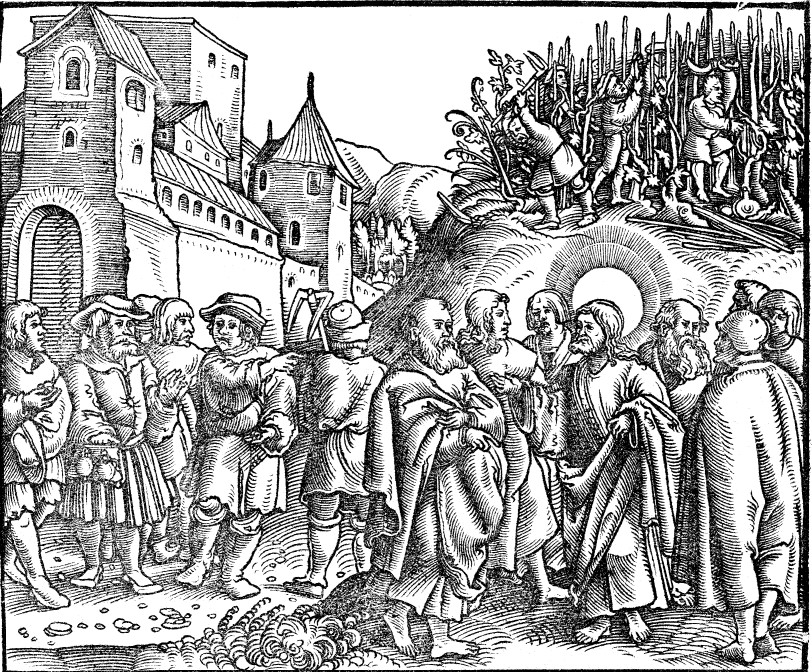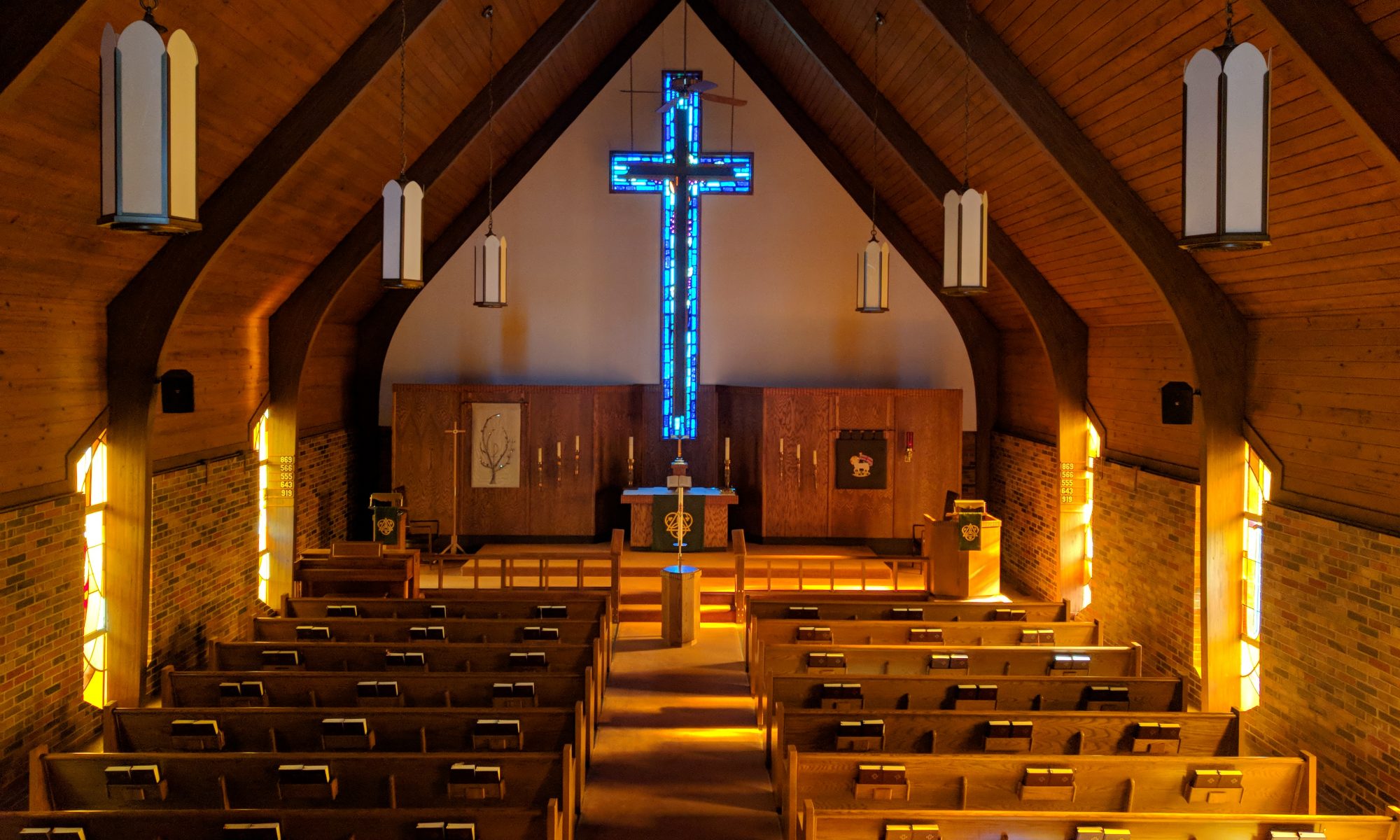
Lessons: Daniel 9:2-10, 1 Corinthians 9:24-10:5, Matthew 20:1-16
Hymns: LSB 693, 566, 758, 555, 919
Grace, mercy, and peace to you from God our Father and our Lord and Savior, Jesus Christ. Amen.
Our Old Testament lesson from Daniel 9:2-10 is largely a prayer offered by the prophet Daniel. Daniel had lived a difficult life, but the Lord was with him wherever he went. Daniel was deported from the Promised Land to Babylon against his will when he was likely a teenager. As if being ripped away from his home was not enough, he was expected to eat foods that were considered unclean, so he sought to eat a diet of only vegetables to prevent himself from being defiled through eating the king’s delicacies.
Because the Lord was with Daniel, he remained healthy and strong. In fact, he was gaining strength and better looks after only eating vegetables. God gave him and his three friends knowledge and skill in all wisdom and literature (Dan. 1:16-17). Guided by the Holy Spirit, Daniel was able to interpret the king’s dreams while he lived in Babylon. The years advanced and he saw kings rise and kings die. Yet, Daniel remained far from the Promised Land for the rest of his life—the next seven decades.
The Babylonian Empire, which rose to power and conquered Judah and Jerusalem, was ultimately conquered. It was replaced by the Medo-Persian Empire in 539 B.C. This significant historic event led Daniel to recall the promise made by God that their time of Babylonian exile would be 70 years, as prophesied by Jeremiah.
Daniel was deported in 605 B.C. in the first of three waves of plundering and deportations by the Babylonians. The final wave, in 586 B.C. was the worst; the Temple of Jerusalem was destroyed, the wall surrounding Jerusalem was in ruins, few escaped deportation, and much of the city’s wealth was stolen—including the gold and sacred vessels in the Temple of God.
Where was God in the midst of all this? Didn’t the people pray for deliverance? Why didn’t God hear their prayers? How could He let such horrible things happen to His chosen people in His holy city?
Daniel knew God’s actions were, in fact, just. That’s why Daniel prayed, “We have sinned and done wrong and acted wickedly and rebelled, turning aside from your commandments and rules. We have not listened to your servants the prophets, who spoke in your name to our kings, our princes, and our fathers, and to all the people of the land. To you, O Lord, belongs righteousness, but to us open shame, as at this day, to the men of Judah, to the inhabitants of Jerusalem, and to all Israel, those who are near and those who are far away, in all the lands to which you have driven them, because of the treachery that they have committed against you. To us, O Lord, belongs open shame, to our kings, to our princes, and to our fathers, because we have sinned against you” (Daniel 9:5-8).
What Daniel prayed for is true. The people rebelled against God, continually sinning against Him. They rejected and persecuted the prophets God sent. They engaged in all sorts of idolatry and adultery. They crudely broke every commandment of God. They did so without shame, figuring that all is fine because they were sincere in actions. They figured God would never harm those in the vicinity of the Temple. They figured they remained in safety. They did the motions they thought God expected, getting circumcised, performing some of the sacred rituals, and offering sacrifices. But their hearts were far from the Lord; sincere faith and devout belief were hard to find.
The years leading up to the destruction of Jerusalem in 586 B.C. parallel too much of what we see today. Many have replaced sacred, reverent worship of Christ with entertaining worship practices or their own forms of spirituality. They have proudly replaced God’s design for marriage and family with destructive behavior filled with sexual deviancy, lewdness, and even surgeries to destroy the body God made in an attempt to turn male into female and female into male. The ministers of Christ whom God raises up are often insulted, mocked, and rejected.
We should all be getting on our knees and praying the prayer of Daniel 9:3-19. His prayer of repentance is sincere, genuine, and heartfelt. He prays, even though he is not personally guilty of many of the wicked crimes committed by his people.
We tend to have an aversion to praying such prayers. When we figure we are innocent, then we think we can stay out of it. We want to accept no responsibility, nor do we want to bear any burdens. And so we carry on, pretending that we are somehow better than others and all those who have committed more serious sins need to figure things out on their own. How we want to wash our hands in innocence when we are not innocent! How we want to claim a righteousness that we do not have! How we love to pretend to be pure when our own lips have been far from pure, and our hearts have been far from leaning upon the promises of God! And so, on bended knee, we should be repenting of our sins and the sins of our nation and our community.
Even when Daniel was commanded by the government to bow down and only worship the king, Daniel refused and only worshipped the true God, which he did three times a day since before he was deported to Babylon (Dan. 6:10-12). His worship involved praying to God and thanking Him! What an act of faith, even though he was far from home against his will.
Today countless stories have been told how many don’t go to church anymore because too much religion was crammed down their throats when growing up or because they didn’t like something that was said by a pastor or a church member. Despite what Daniel endured, he didn’t stop his life of prayer and thanksgiving. He could have complained about the offenses caused by so many of his own people who claimed to be religious. He could have blamed God for his difficult life—how so many comforts of home were stolen from him at such a young age. But instead, affliction drew Daniel closer to his Savior. A life of ease often results in weakness. But through affliction, Daniel was strengthened. And more important, Daniel knew what awaited him. He knew there was more to life than simply what is seen and experienced in the here and now. Daniel knew that God remained merciful to him and that he would receive from his Savior the crown of righteousness which would be awarded to all who abide in Christ through faith.
Daniel began his prayer, saying, “O Lord, the great and awesome God, who keeps covenant and steadfast love with those who love him and keep his commandments.” Our great and awesome God does not break His promises. In fact, He loves His people unconditionally. Daniel also prayed, “To the Lord our God belong mercy and forgiveness,” recognizing that God is truly merciful and forgiving.
Every time I have read this prayer of Daniel’s, I have been astounded. I have thought of it as a wonderful prayer that we would do well to pray ourselves. I have wondered what his thrice daily prayers were like. How interesting it would have been to have had more of his prayers passed on to us.
God heard Daniel’s plea. God knew that the time of waiting was drawing to a close. Those 70 years of exile were almost up. A new kingdom had arisen. The Israelite people would soon be allowed to return home.
Their arrival back in the Promised Land, which Daniel never got to do, was filled with trials and hardships as they resettled and reestablished the land. But Daniel was received into a better Promised Land. He was received into the gates of Paradise. His salvation was not based on how good he was or on how much he prayed. Instead, his salvation was by grace. God graciously revealed Himself to Daniel. By grace later in Daniel 9, Daniel would see a vision from the angel Gabriel that Jesus would come to finish transgression, make an end of sins, make reconciliation for iniquity, bring in everlasting righteousness, seal up vision and prophecy, and anoint the Most Holy One. In that time, the Messiah the Prince would be cut off (Dan. 9:20-27). That is, the Christ would take away the sin of the world through His all-sufficient sacrifice on the cross. Despite man’s continued rebellion, in love Jesus would bear the world’s sin and pay for the sins of all people.
That’s what our Savior does by grace. We don’t deserve the least of His mercies, yet He for the joy that was set before Him endured the cross so that our sins would be cancelled out. Even those who mock and ridicule our Lord, those who deliberately choose to transgress God’s laws and purposefully walk in a way apart from our Lord, Jesus died on the cross for them. He paid for the sins of the entire world.
By grace through faith, we receive the forgiveness of sins He earned. Just as the workers in the vineyard received the same wage, so also those who believe in Christ receive the same salvation.
But all who do not believe or refuse to repent of their sins will be condemned. Knowing this, we get on our knees and pray—just like Daniel. We don’t pray to get God to change His mind, but to get those who reject the gifts of God to change theirs. We pray knowing that God is gracious and merciful, compassionate and abounding in steadfast love. We pray knowing that Christ has redeemed us on the cross and He lives to give us the gift of everlasting life. We pray as victors, receiving the eternal inheritance that outweighs all crosses or trials. We pray in faith, knowing that God is gracious. Amen.
The peace of God which passes all understanding keep your hearts and minds in Christ Jesus to life everlasting. Amen

